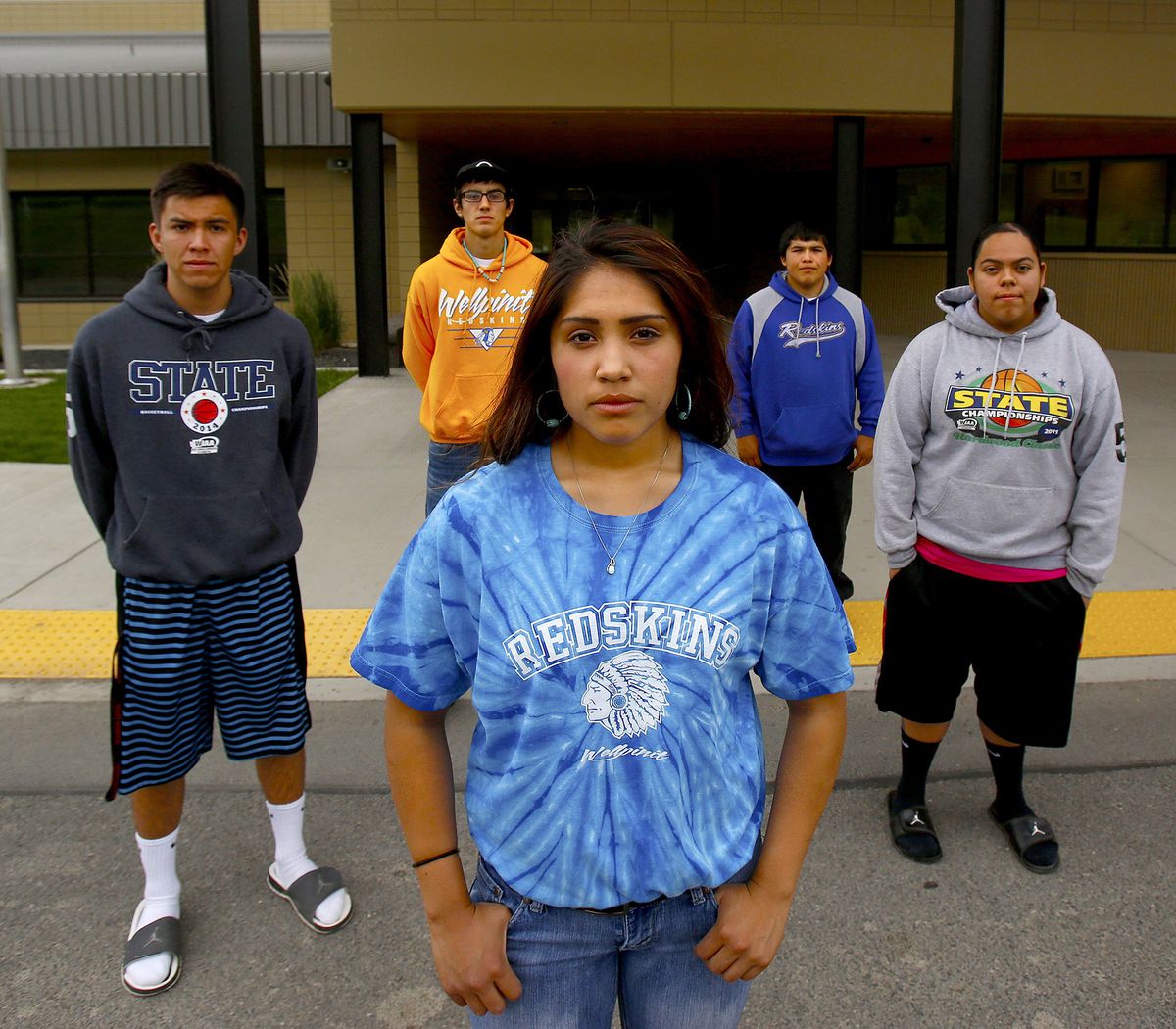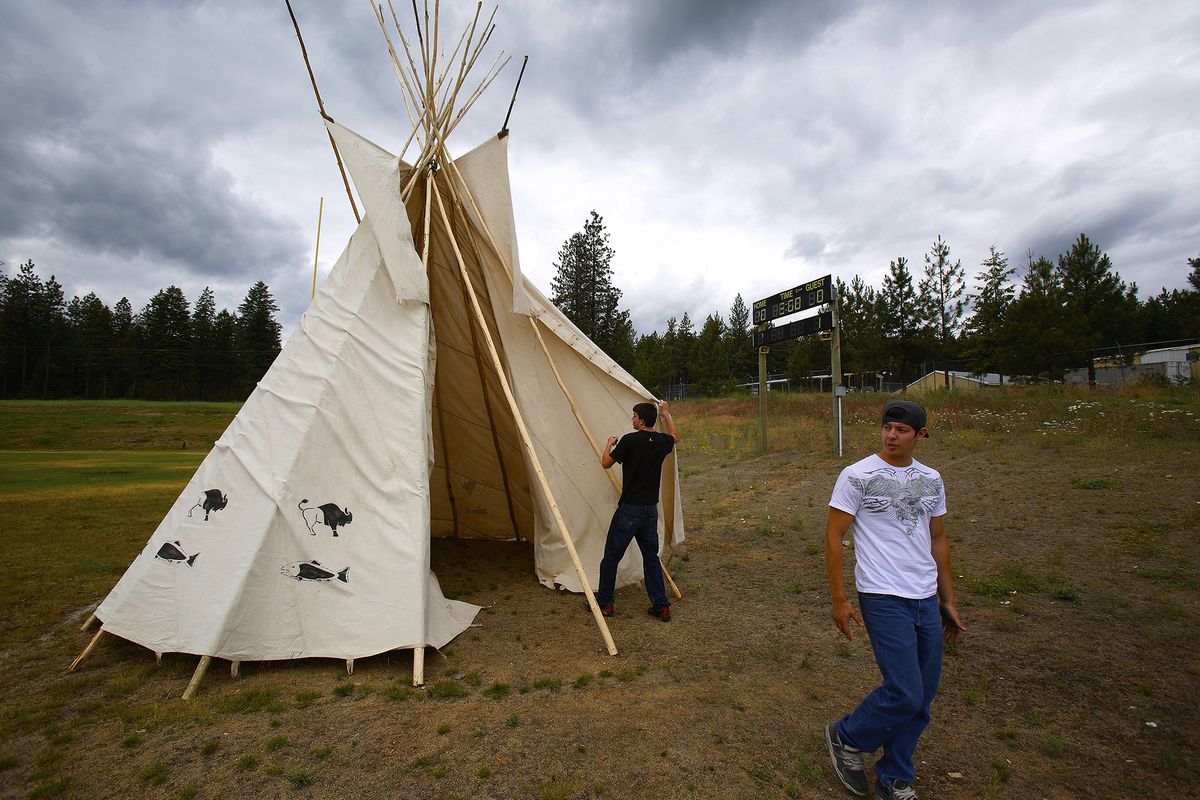For Wellpinit students, ‘Redskins’ a source of pride, tradition
From left, James Best, 18; Brodie Ford, 17; Kyra Antone, 17; Triston Andrews, 17; and Sami Parr, 19, attend Wellpinit High School. The school serves the Spokane Indian Reservation, and its mascot is the Redskins. (Mark Harrison / The Seattle Times)
WELLPINIT, Wash. – This town of 928 – with its one grocery store, one gas station and one stop sign – is far, far away from the national controversies of the day.
To get here, you drive about an hour north of Spokane, past fields of barley, wheat and canola with yellow flowers, past the forests.
It is home for the Spokane Tribe of Indians, and for 107 years, the Wellpinit High School mascot name has been Redskins.
Wellpinit doesn’t particularly want to be a part of stories about its mascot.
But the tribe gets calls because of the controversy 2,600 miles away in Washington, D.C., with the Redskins NFL team.
The United States Patent and Trademark Office last month canceled the team’s trademark registration, deeming the name disparaging to Native Americans. Various media outlets around the country, including the Seattle Times, have stopped using the name, except in stories about the controversy, because it is offensive.
In its defense, the Washington football team in 2013 linked to a list of 70 high schools using the Redskins name and later specifically referred to Wellpinit.
“One thing that annoys me,” said John Teters, registrar for the school district, “is that we’re used as an excuse for this asinine process. You name it, Cleveland Indians, Washington Redskins, whenever those names come up, the school gets called. ‘If you guys can do it, why can’t we?’ We’re somehow used as a justification.”
The school district isn’t in a big hurry to change the name and sees no big push for it.
The high school is the only one in this state using that name.
Last year, the Port Townsend School Board voted to abolish Redskins as its high school’s mascot. They’re now the Redhawks.
A list of school mascot names in this state, compiled by Marc Sheehan, a Federal Way teacher, shows a few Indians and Chiefs – also not appreciated by Native Americans – but mostly a lot of names along the lines of Eagles and Mustangs.
Michael Seyler has been on the Wellpinit School Board for 19 years. He said there might be a community meeting sometime to discuss the name, and maybe a vote, but nothing is scheduled.
“Casual interest” is how Seyler describes community concern about that “back East” controversy.
Take Clarence Le Bret, who at 90 says he’s the oldest male tribal member in town.
Controversy? What controversy, he said. “It’s the traditional name we always had.”
Le Bret said he helped raise five boys and two girls and would go to all the school sports games in which they played.
“After that I was sported out,” he said, and doesn’t much care about the NFL or any other team.
But with many here, the team-mascot name means a lot.
Here, the kids have their “Wellpinit Redskins” T-shirts and sweatshirts they wear to games or Spirit Week. At games, they chant, “Redskin Power!”
“It’s not a negative name for us,” said Kyra Antone, 17, who’s going into 12th grade and is wearing one of the Redskins T-shirts. “Whenever I think of Redskins, I think of pride in our sports teams. There’s nothing wrong with being a 17-year-old Native American.”
How to react to the national news does seem to break down along generational lines.
“We don’t see it as a derogatory name. But if you ask a grandpa or grandma, they think of it differently,” said Brodie Ford, 17, who just graduated and is heading to Whitworth University.
Ford said that in sports, when playing other schools, he didn’t hear “Redskins” used in a derogatory way.
But older tribal members sure do remember insults about their heritage, although it wasn’t the Redskins name that was used.
James Seyler, 46, from the high school’s class of 1986, who works for the tribe’s historic-preservation program, remembers his basketball days.
When playing at other schools, Wellpinit players were called derogatory names.
On a recent afternoon, on the school football field, Seyler is showing a couple of teens the techniques for building a tepee with 17 lodge poles for an upcoming contest.
Seyler wants to keep the mascot name.
“We shouldn’t change it because everybody in politics wants us to change the name,” he said. “We’ve been here for thousands for years. It’s people who weren’t raised here who are bothered by it.”
Still, for a number of Native Americans, the Redskins name is an insult that strikes at their emotions.
“This country was founded on bounties. I grew up with my dad talking about the genocide of Indians,” said Chet Bluff, 53. “This should be in the history books.”
Bluff said she was taught that “Redskin” refers to the bloodied scalp that bounty hunters used to show proof of a kill.
She said she told a white co-worker who asked what the “Redskin” controversy was about:
“Imagine my husband, my dad, my brother and granddaughter being killed and skinned for $800. Her jaw dropped,” Bluff said.
That the term is derived from the blood from the scalp of a Native American is in dispute, as is often the case with what is and isn’t historically provable.
Ives Goddard, emeritus senior linguist at the Smithsonian Institution’s Department of Anthropology, in 2005 wrote a research paper on the term.
He said the assertion became popularized when American Indian rights activist Suzan Harjo said it on the “Oprah Winfrey Show” in 1992.
“There wasn’t anything to support the connection,” Goddard said. “But that’s what everybody now thinks.”
In fact, he said, it was Indians who first came up with the term when the whites showed up in this continent: “You guys are white, we are red.” It became derogatory in later usage, he said.
And, Goddard added, what’s acceptable “is based on today’s language,” and the term is clearly offensive to many.
Meanwhile, life ambles on in this quiet town.
Brodie Ford’s family is justifiably proud that he earned a full-ride college Gates Millennium scholarship.
He had to write six essays in his application.
In one essay, Ford told about his upbringing:
“When I was eight years old my dad began taking me to his farms, and for every day of the summer, I was down at the farms with my dad. He put me in his lap, and showed me how every single instrument on the tractor worked. To this very day, I remember everything that he taught me. During those hot, dry summer days, I learned how to ride a horse, drive a tractor, bail hay, and how to catch and tag a buffalo.”
In another essay, he concluded, “I’m just a kid from a rural reservation who wants to make a difference.”
Let the East Coast fester in the Redskins name controversy.
“I use the name proudly,” Ford said. “I wear it with respect.”

